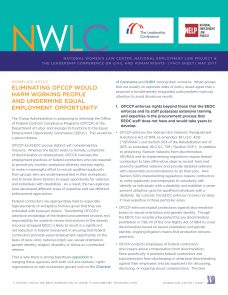Abortion rights, women of color, and LGBTQI+ people are under attack. Pledge to join us in fighting for gender justice.

 The Trump Administration is proposing to eliminate the Office of Federal Contract Compliance Programs (OFCCP) at the Department of Labor and reassign its functions to the Equal Employment Opportunity Commission (EEOC). This would be a grave mistake.
The Trump Administration is proposing to eliminate the Office of Federal Contract Compliance Programs (OFCCP) at the Department of Labor and reassign its functions to the Equal Employment Opportunity Commission (EEOC). This would be a grave mistake.
OFCCP and EEOC pursue distinct yet complementary missions. Whereas the EEOC seeks to remedy complaints of discrimination in employment, OFCCP oversees the employment practices of federal contractors who are required to proactively monitor workplace diversity and pay equity, to make a meaningful effort to recruit qualified applicants from groups who are underrepresented in their workplaces, and to break down barriers to equal opportunity for veterans and individuals with disabilities. As a result, the two agencies have developed different areas of expertise and use different enforcement approaches.
Federal contractors are appropriately held to especially high standards of workplace fairness given that they are entrusted with taxpayer dollars. Transferring OFCCP’s extensive knowledge of the federal procurement process and responsibility for systemic review and analysis to the already resource-strapped EEOC is likely to result in a significant net reduction in federal investment in ensuring that federal contractors promote equal employment opportunity on the basis of race, color, national origin, sex, sexual orientation, gender identity, religion, disability or status as a protected veteran.
That is why there is strong bipartisan opposition to merging these agencies with both civil and workers’ rights organizations as well as business groups such as the Chamber of Commerce and SHRM voicing their concerns. When groups that are usually on opposite sides of policy issues agree that a proposal is fundamentally misguided, policymakers must pay attention to avoid disastrous results.
1. OFCCP enforces rights beyond those that the EEOC enforces and its staff possesses extensive training and expertise in the procurement process that EEOC staff does not have and would take years to develop.
2. OFCCP does not just remedy individual instances of discrimination, but rather works with contractors to ensure that they meet higher standards of fairness and opportunity with regard to their employment practices.
3. OFCCP’s primary mission, unlike that of the EEOC, is to undertake systemic compliance reviews, which identify hiring and wage discrimination.
4. In addition to seeing back-pay, benefits and wage adjustments. OFCCP has authority to debar contractors from future federal contracts, a powerful tool to urge compliance with the laws and regulations governing federal contract employment; the EEOC has no such authority.
5. Pursuant to longstanding working agreements, OFCCP and the EEOC already closely coordinate to avoid duplication of effort.
6. The EEOC does not have the capacity to absorb OFCCP’s many unique functions.

